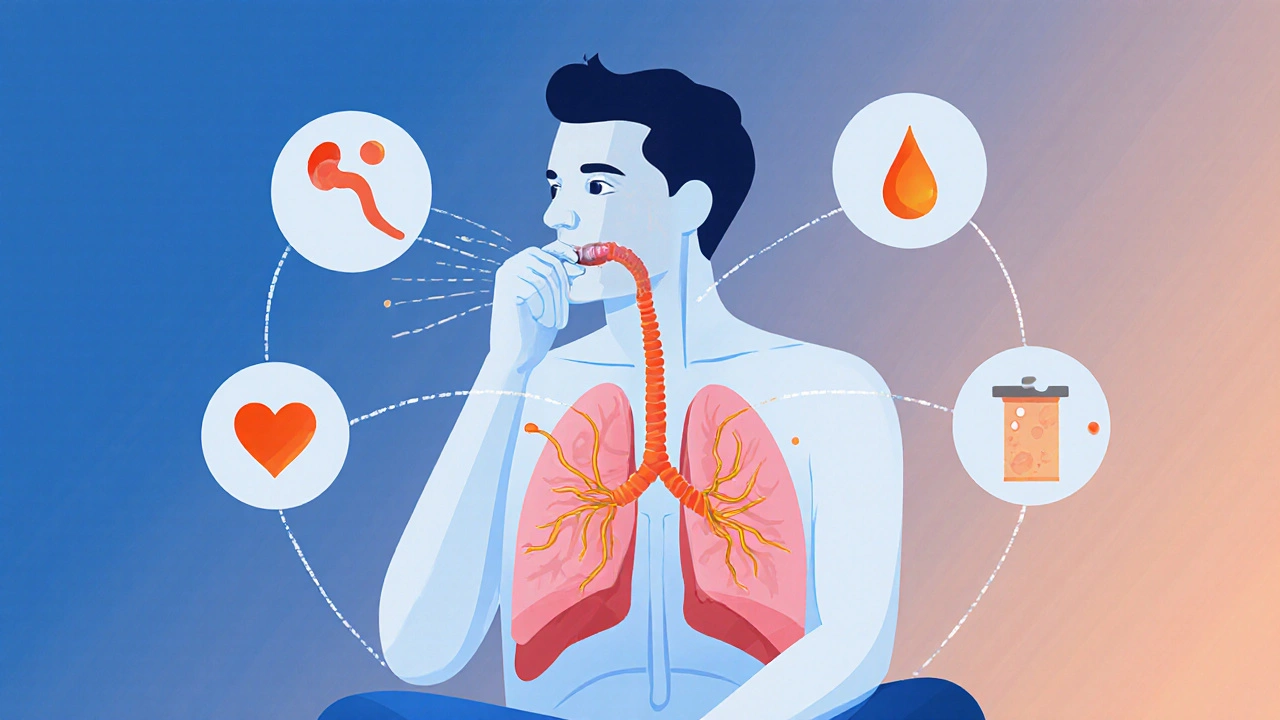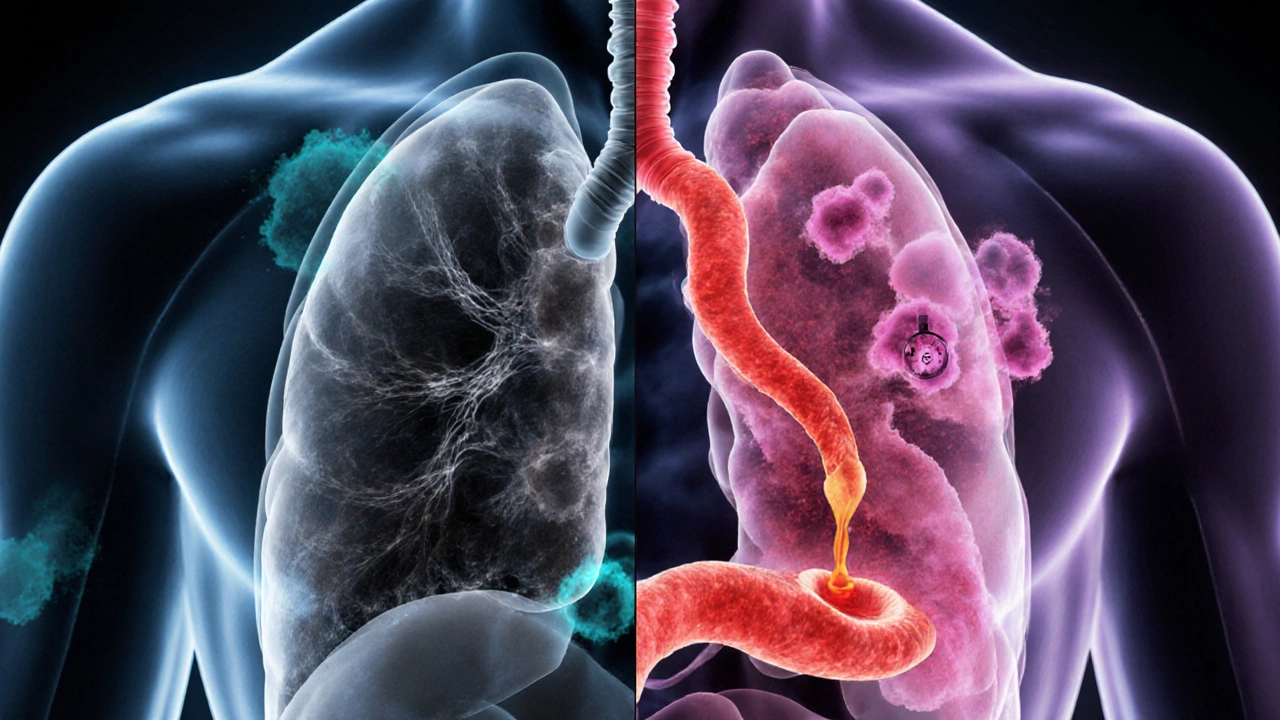COPD and GERD Symptom Checker
This tool helps identify potential overlapping symptoms between COPD and GERD. Answer the following questions to get personalized insights about your symptoms.
Answer the questions above to see how your symptoms might relate to COPD and GERD.
Symptom Categories
Respiratory Symptoms
Chronic cough, shortness of breath, wheezing, chest tightness.
Digestive Symptoms
Heartburn, acid reflux, sour taste, regurgitation.
Overlapping Symptoms
Cough that worsens after meals, nighttime symptoms, chest discomfort.
Key Takeaways
- Both COPD and GERD share inflammation pathways that can worsen each other.
- Common symptoms like chronic cough and shortness of breath may stem from either condition.
- Accurate diagnosis often requires lung function tests and an endoscopy.
- Lifestyle changes-quitting smoking, weight management, and diet-help control both diseases.
- Coordinated medication plans (bronchodilators + PPIs) can reduce flare‑ups and improve quality of life.
What Is Chronic Obstructive Pulmonary Disease?
Chronic Obstructive Pulmonary Disease is a progressive lung disorder characterized by airflow limitation that is not fully reversible, usually caused by long‑term exposure to irritants such as cigarette smoke. It includes emphysema and chronic bronchitis, leading to symptoms like persistent cough, sputum production, and breathlessness that worsen over time.
The disease affects roughly 4% of adults worldwide, with the majority of cases linked to smoking. Inflammation, mucus hypersecretion, and loss of elastic recoil in the lungs impair gas exchange, making patients vulnerable to infections and exacerbations.
What Is Gastroesophageal Reflux Disease?
Gastroesophageal Reflux Disease is a chronic condition where stomach acid and sometimes bile flow back into the esophagus, irritating its lining. The key player is the Lower Esophageal Sphincter (a muscular ring at the junction of the esophagus and stomach that normally stays closed to prevent reflux). When the LES weakens or relaxes inappropriately, acid reflux occurs, causing heartburn, regurgitation, and chest discomfort.
GERD affects up to 20% of adults in Western countries and is often associated with obesity, hiatal hernia, and certain medications.
Why Do COPD and GERD Often Appear Together?
Research shows a bidirectional relationship: the inflammation that drives COPD can increase abdominal pressure, pushing stomach contents upward. Conversely, chronic acid exposure can irritate the airways, triggering bronchoconstriction and coughing.
Several mechanisms explain the link:
- Mechanical pressure. Persistent coughing in COPD raises intra‑abdominal pressure, overwhelming the LES and promoting reflux.
- Neural reflexes. Acid in the esophagus stimulates the vagus nerve, which can cause bronchospasm-an effect known as the esophago‑bronchial reflex.
- Systemic inflammation. Cytokines like interleukin‑6 and tumor necrosis factor‑α circulate in both diseases, worsening airway inflammation and esophageal irritation.
- Medication side effects. Some bronchodilators (especially theophylline) can relax the LES, while inhaled steroids may increase the risk of gastro‑intestinal ulcers.
Because the two conditions reinforce each other, treating one without addressing the other often yields limited relief.

Shared Symptoms: How to Tell Them Apart
Both COPD and GERD can cause chronic cough, throat clearing, and shortness of breath. The key is to look for context clues:
- Timing. GERD‑related cough often worsens after meals or when lying flat, while COPD cough is more constant and linked to exertion.
- Acidic taste. A sour or bitter taste in the mouth suggests reflux.
- Chest tightness. GERD may produce a burning sensation behind the breastbone, whereas COPD tightness feels more like a heavy weight on the ribs.
When symptoms overlap, clinicians rely on diagnostic tests to pinpoint the dominant cause.
How Doctors Diagnose the Overlap
Accurate diagnosis usually involves a combination of pulmonary and gastrointestinal assessments.
| Test | Purpose | What It Reveals |
|---|---|---|
| Pulmonary Function Test (spirometry measuring airflow obstruction) | Assess lung capacity and obstruction severity | FEV1/FVC ratio < 0.70 confirms COPD |
| Esophagogastroduodenoscopy (EGD) | Visualize esophageal lining | Detect erosive esophagitis, Barrett’s esophagus |
| 24‑hour pH monitoring | Quantify acid exposure in the esophagus | Elevated acid exposure confirms GERD |
| Chest X‑ray or CT scan | Rule out other lung pathologies | Shows hyperinflation, emphysematous changes |
In practice, doctors may start with a spirometry test and a trial of acid‑suppressive medication. If symptoms persist, an endoscopy or pH study is ordered.
Managing Both Conditions Together
Successful treatment hinges on a coordinated plan that tackles airway inflammation, reduces acid reflux, and modifies lifestyle factors.
Medications
- Bronchodilators. Short‑acting beta‑agonists (SABAs) relieve acute breathlessness. Long‑acting agents (LABAs) improve daily function. Choose formulations with minimal LES relaxation.
- Inhaled corticosteroids. Reduce airway inflammation but monitor for gastrointestinal side effects. Pair with a proton pump inhibitor if ulcer risk is high.
- Proton Pump Inhibitors (PPIs). Proton Pump Inhibitor (a drug class that suppresses stomach acid production) like omeprazole or esomeprazole heal esophageal lining and lower cough frequency.
- Prokinetics. Medications such as metoclopramide enhance gastric emptying, reducing reflux episodes.
Lifestyle Tweaks
- Quit Smoking (the leading risk factor for COPD). Even a reduction improves LES tone and lung clearance.
- Maintain a healthy weight; excess abdominal fat raises intra‑abdominal pressure, worsening GERD.
- Elevate the head of the bed 6-8 inches to prevent nighttime reflux.
- Avoid large meals, citrus, chocolate, caffeine, and alcohol within 3hours of lying down.
- Incorporate gentle breathing exercises (e.g., pursed‑lip breathing) to lessen cough triggers.
Monitoring and Follow‑up
Patients should keep a symptom diary noting when cough or breathlessness occurs, diet, and medication timing. Regular follow‑ups every 3-6months allow clinicians to adjust inhaler doses and acid‑suppression therapy based on spirometry results and reflux symptom scores.
When to Seek Immediate Help
Both COPD exacerbations and severe GERD complications can become medical emergencies. Call a healthcare provider or go to the ER if you notice:
- Sudden worsening of shortness of breath that doesn't improve with rescue inhaler.
- Chest pain radiating to the jaw or arm (could signal heart involvement).
- Frequent vomiting or inability to keep fluids down, leading to dehydration.
- Black or bloody stools, indicating possible gastrointestinal bleeding from ulcer disease.
Early intervention can prevent hospital admission and protect lung function.
Frequently Asked Questions
Does treating GERD improve COPD symptoms?
Yes, many patients report reduced cough and fewer exacerbations after effective acid suppression. PPIs or H2 blockers lessen esophageal irritation, which in turn reduces airway reflex coughing.
Can COPD medications make GERD worse?
Some bronchodilators, especially oral theophylline, can relax the lower esophageal sphincter and increase reflux. Inhaled agents are less likely to have this effect, but doctors often pair them with PPIs if reflux symptoms emerge.
Is surgery ever needed for the overlap?
Rarely. Anti‑reflux surgery (e.g., laparoscopic fundoplication) is considered when medical therapy fails and reflux is clearly aggravating lung disease. The decision weighs surgical risk against potential lung‑function gains.
What lifestyle changes give the biggest benefit?
Quitting smoking tops the list, followed by weight management and sleeping with the head elevated. Small, frequent meals and avoiding trigger foods also cut down reflux episodes.
Can I exercise if I have both conditions?
Yes, low‑impact activities like walking, swimming, or stationary cycling improve lung capacity and aid digestion. Start slowly, use inhalers as prescribed, and avoid vigorous workouts right after large meals.
Understanding the COPD and GERD connection empowers patients to tackle two tough illnesses with a single, smarter plan. By addressing inflammation, adjusting medications, and adopting proven lifestyle habits, many people experience fewer flare‑ups, better breathing, and a calmer stomach.

Phil Best
October 5, 2025 AT 17:18Now I'm convinced my pizza was staging a coup against my diaphragm. Who knew my esophagus was the real MVP of my respiratory disaster?
Parv Trivedi
October 6, 2025 AT 01:47Willie Randle
October 6, 2025 AT 20:26Connor Moizer
October 7, 2025 AT 17:26Quit smoking? Yeah, sure. But also, stop eating tacos at midnight. That’s the real hack. No doctor told me that.
kanishetti anusha
October 8, 2025 AT 18:35roy bradfield
October 9, 2025 AT 15:30Patrick Merk
October 10, 2025 AT 05:14Liam Dunne
October 10, 2025 AT 20:44Vera Wayne
October 11, 2025 AT 22:31Rodney Keats
October 12, 2025 AT 16:30Laura-Jade Vaughan
October 13, 2025 AT 18:51Jennifer Stephenson
October 14, 2025 AT 19:55